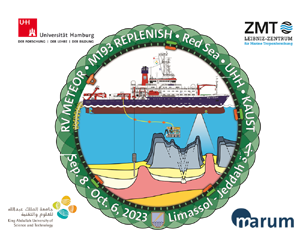REPLENISH
Red Sea Paleoenvironmental Evolution under Monsoon fluctuations in the Pleistocene to Holocene

Although the Red Sea is situated within the Saharo-Arabian desert belt, a key-area for palaeo-climatic and palaeo-anthropological research, its marine realm, including climate archives, is only locally and sporadically studied. Therefore, the cruise M193 aims to investigate whether and how Pleistocene humidity-aridity phases are recorded in marine sediments; how these periods affected the development of shallow- and deep-water carbonate systems along offshore western Saudi Arabia; and where unique warm-water (>20°C) high-salinity deep-sea corals assemblages with an unclear taxonomy thrive. Based on recent seafloor mapping and gravity coring, we are investigating the Al Wajh carbonate platform area that hosts a deep-sea fan fed by one of the largest onshore drainage systems on the Arabian Peninsula during Pleistocene pluvial phases, several isolated mini basins related to salt tectonics, and dozens of deep-sea coral habitats and drowned shallow-water reefs. While seismic measurements are planned to investigate the evolution of the Late Pliocene to Pleistocene marginal sediment system under sea-level and climatic change, gravity coring of isolated and communicating sediment basins will allow high-resolution studies of Upper Pleistocene humidity-aridity phases. Mapping and sampling of the largely unstudied deep-water coral habitats via ROV (MARUM, Squid) and taxonomy studies will round up our survey. Expected results will extend our comprehensive understanding of Pleistocene climate development including sea-level change, its influence on the development of shallow- and deep-water carbonates, and will help to predict future climate dynamics. Partner university in Saudi Arabia is the King Abdullah University of Science and Technology (KAUST).The cruise took place from the 8th September to the 6th October with the FS Meteor (M193).
Principal Investigator
Thomas Lüdmann (Institut für Geologie, Hamburg)
Hildegard Westphal (MARUM/ZMT)
Coordination
Dr. Thomas Lüdmann (IfGeo, Hamburg)
Project Duration
2023 – 2025
